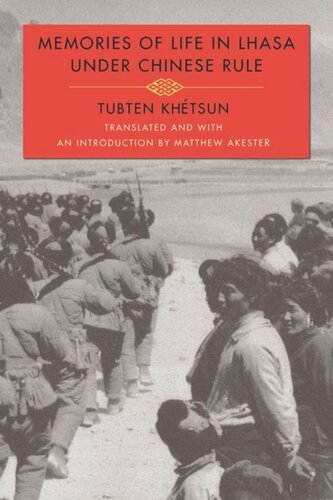

Most ebook files are in PDF format, so you can easily read them using various software such as Foxit Reader or directly on the Google Chrome browser.
Some ebook files are released by publishers in other formats such as .awz, .mobi, .epub, .fb2, etc. You may need to install specific software to read these formats on mobile/PC, such as Calibre.
Please read the tutorial at this link: https://ebookbell.com/faq
We offer FREE conversion to the popular formats you request; however, this may take some time. Therefore, right after payment, please email us, and we will try to provide the service as quickly as possible.
For some exceptional file formats or broken links (if any), please refrain from opening any disputes. Instead, email us first, and we will try to assist within a maximum of 6 hours.
EbookBell Team

4.7
46 reviewsBorn in 1941, Tubten Khétsun is a nephew of the Gyatso Tashi Khendrung, one of the senior government officials taken prisoner after the Tibetan peoples' uprising of March 10, 1959. Khétsun himself was arrested while defending the Dalai Lama's summer palace, and after four years in prisons and labor camps, he spent close to two decades in Lhasa as a requisitioned laborer and "class enemy." In this eloquent autobiography, Khétsun describes what life was like during those troubled years. His account is one of the most dispassionate, detailed, and readable firsthand descriptions yet published of Tibet under the Communist occupation.
Born in 1941, Tubten Khétsun is a nephew of the Gyatso Tashi Khendrung, one of the senior government officials taken prisoner after the Tibetan peoples' uprising of March 10, 1959. Khétsun himself was arrested while defending the Dalai Lama's summer palace, and after four years in prisons and labor camps, he spent close to two decades in Lhasa as a requisitioned laborer and "class enemy."
In this eloquent autobiography, Khétsun describes what life was like during those troubled years. His account is one of the most dispassionate, detailed, and readable firsthand descriptions yet published of Tibet under the Communist occupation. Khétsun talks of his prison experiences as well as the state of civil society following his release, and he offers keenly observed accounts of well-known events, such as the launch of the Cultural Revolution, as well as lesser-known aspects of everyday life in occupied Lhasa.
Since Communist China continues to occupy Tibet, the facts of this era remain obscure, and few of those who lived through it have recorded their experiences at length. Khétsun's story will captivate any reader seeking a refreshingly human account of what occurred during the Maoists' shockingly brutal regime.